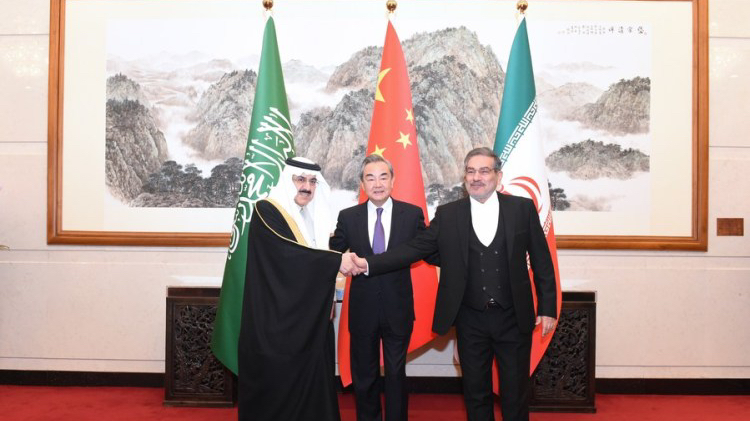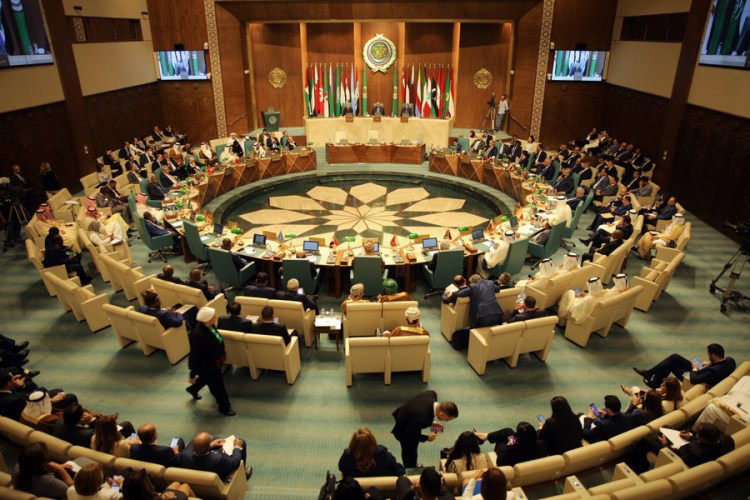
Wang Yi (C), a member of the Political Bureau of the Communist Party of China (CPC) Central Committee and director of the Office of the Foreign Affairs Commission of the CPC Central Committee, attends a closing meeting of the talks between the Saudi delegation led by Musaad bin Mohammed Al-Aiban (L), Saudi Arabia's Minister of State, Member of the Council of Ministers and National Security Advisor, and Iranian delegation led by Admiral Ali Shamkhani (R), Secretary of the Supreme National Security Council of Iran, in Beijing, capital of China, March 10, 2023. /Xinhua
Wang Yi (C), a member of the Political Bureau of the Communist Party of China (CPC) Central Committee and director of the Office of the Foreign Affairs Commission of the CPC Central Committee, attends a closing meeting of the talks between the Saudi delegation led by Musaad bin Mohammed Al-Aiban (L), Saudi Arabia's Minister of State, Member of the Council of Ministers and National Security Advisor, and Iranian delegation led by Admiral Ali Shamkhani (R), Secretary of the Supreme National Security Council of Iran, in Beijing, capital of China, March 10, 2023. /Xinhua
Editor's note: Wang Jin is an associate professor in Northwest University of China. The article reflects the author's opinions and not necessarily the views of CGTN.
Iran's Foreign Ministry spokesman said on May 8 that the reopening process of the Iranian diplomatic mission in Saudi Arabia is in its final stage, according to official news agency IRNA. The two major Middle East countries once often found themselves competing with each other over issues ranging from ideological differences to geopolitical competition. Now, the reopening of Iran-Saudi Arabia embassies shows bilateral political trust is potentially transforming the Middle East into a region of conciliation and collaboration.
On the one hand, reopening embassies is one of the major steps to carry out the China-mediated agreement reached between Saudi Arabia and Iran in March. On the other hand, it represents a symbolic first step towards de-escalating tensions between the two countries whose animosity once reached boiling point amidst allegations of espionage, cyberattacks, drone strikes and tit-for-tat executions.
Meanwhile, reopening embassies with each other would facilitate bilateral trade and communications. After the two countries suspended bilateral relations, despite inherent ideological and doctrinal differences, Iran and Saudi Arabia still maintained economic connections through other Middle East states, especially their Gulf neighbors. Normalizing diplomatic relations provides new opportunities for direct investments, cross-border trade, technology transfer, and tourism that benefit not only the two countries, but also neighboring states.
The normalization of relations between Saudi Arabia and Iran could indeed help ease regional tensions. The restoration of diplomatic relations between Iran and Saudi Arabia could potentially offer the chance for improved regional cooperation, conflict resolution and ultimately result in decreased hostilities throughout the Middle East. As there are many shared concerns such as sectarian rivalries, proxy wars and maritime disputes which require coordinated action, the reopening of embassies promotes peace and stability in the region.
By working together, Iran and Saudi Arabia could help settle the crisis in some Middle East states. In the past years, Iranian and Saudi rivalries have been playing major roles in worsening sectarian divisions in Lebanese politics, leading to longstanding deadlocks in government formation. With the thawing of relations, Iran and Saudi Arabia could encourage Lebanese Prime Minister Najib Mikati to work towards finding compromises necessary for economic reconstructions. For Iraq, this could limit rivalries between different political factions, and help seek common ground.

The scene of an Arab League (AL) extraordinary meeting held in Cairo, Egypt, May 7, 2023. /Xinhua
The scene of an Arab League (AL) extraordinary meeting held in Cairo, Egypt, May 7, 2023. /Xinhua
Moreover, reopening embassies signals a strong willingness between Iran and Saudi Arabia to help end regional hostilities. As key players in the Middle Eastern geopolitical landscape, increased collaborations between Iran and Saudi Arabia could facilitate positive change throughout the entire region.
In the process of rapprochement between Saudi Arabia and Iran, China plays a crucial role in bringing the two sides together and facilitating the construction of bilateral political trust. Through this peace process, China shows its willingness in shaping a more peaceful and prosperous future for the Middle East based on mutual respect and equality. China's non-interventionist approach has earned respect and trust among Middle East states, particularly when compared to Western hegemony and unilateralism. China's policies on the Middle East emphasize cooperation rather than confrontation and will continue to help smooth relations in the region.
Although it is difficult to determine whether U.S. influence in the Middle East is on the wane, it is true that the improved relationship between Iran and Saudi Arabia will likely have an impact on the region's political landscape and potentially prompt a change in Washington's position. In particular, the possibility exists that increased cooperation between Iran and Saudi Arabia could lead to coordinated efforts to fix issues affecting the entire region without direct involvement from the United States and other Western powers.
The reopening of embassies between Iran and Saudi Arabia after years of distrust and competition is a harbinger of greater autonomy and independence of Middle East countries over their own affairs. It's also a welcome sign that Syria is back in the Arab League after more than a decade of membership suspension.
All these point to serious efforts to cut dependence on Western powers, signaling a new era of self-determination for nations in the region. It demonstrates willingness among Middle East states to prioritize mutual coexistence and avoid conflict, which would create opportunities for future prosperity across the entire region. By building strong relationships with one another, these countries will gain more leverage in global affairs and strengthen their voice at various international organizations.
As the peace process in the Middle East is unfolding, we can see a path towards normalizing relations and building lasting partnerships across the region.
(If you want to contribute and have specific expertise, please contact us at opinions@cgtn.com. Follow @thouse_opinions on Twitter to discover the latest commentaries in the CGTN Opinion Section.)